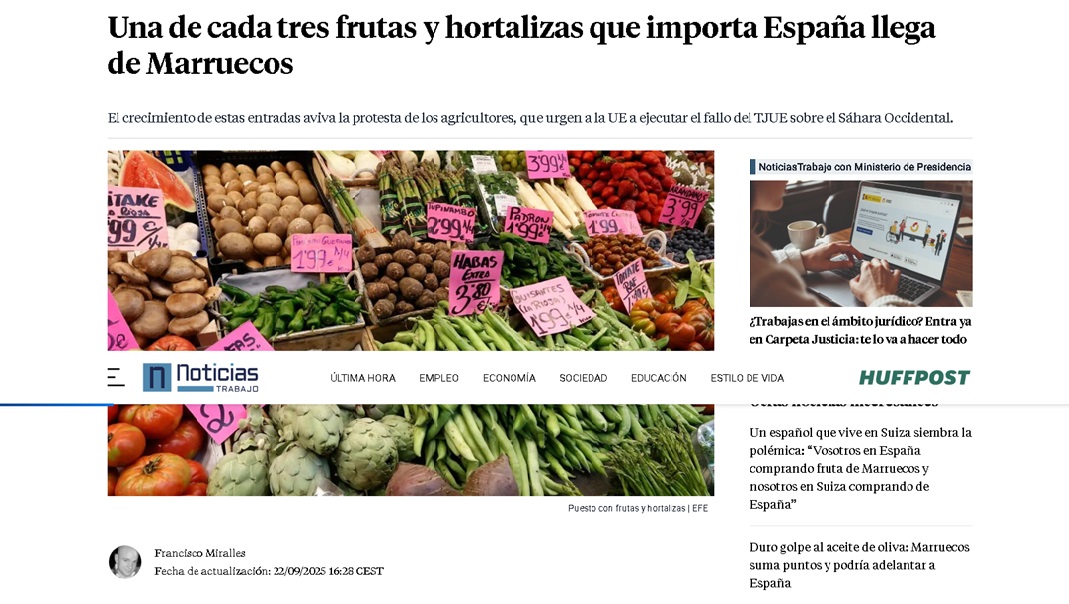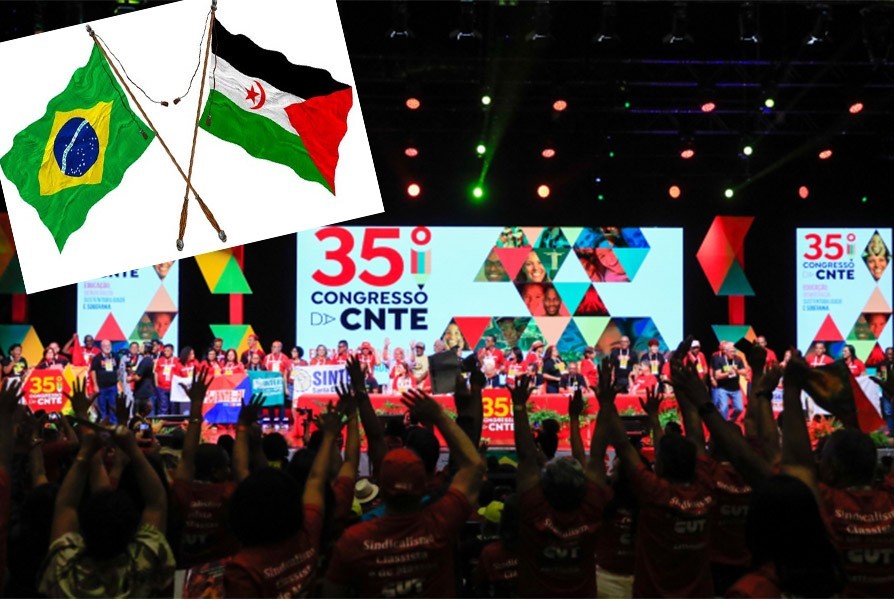
Madrid (Spain), 22 September 2025 (SPS) – Spanish economic reports, cited by journalist Francisco Miralles in a news article published by the Spanish أHuffpost on 22 September, revealed an unprecedented increase in Madrid’s imports of fruits and vegetables from Morocco. The surge has sparked widespread protests among Spanish farmers, who called on the European Union to implement the rulings of the European Court of Justice regarding Western Sahara.
According to official data from the Spanish Federation of Associations of Producers and Exporters of Fruits, Vegetables, Flowers and Live Plants (FEPEX), quoted by the journalist, the value of Spain’s imports of "Moroccan" agricultural products reached about €672 million in the first four months of this year, rising to €899.5 million in the first half of 2025, a 33% increase compared to 2024. Morocco is now Spain’s top supplier in this sector in terms of value.
Although France still ranks first in terms of volume, Morocco continues to narrow the gap. Tomatoes have emerged as one of the most sensitive issues: Spanish imports of Moroccan tomatoes rose by 269% over the last decade, from 18,045 tons in 2014 to 66,624 in 2024, while Spain’s tomato exports to the EU fell by 25% during the same period. This has deepened local producers’ concerns over losing market share.
Spanish farmers’ associations have warned that part of the pricing pressure in the markets stems from insufficient oversight of the entry-price system at the border, particularly regarding tomatoes. They urged Brussels to take urgent action to prevent any attempts to circumvent regulations.
On another hand, the Sahrawi Group Monitoring Natural Resources and Related Legal Issues (a Sahrawi official group), through its Chairperson, Oubi Buchraya Bachir, told Sahara Press Service (SPS) that “Morocco continues its systematic plunder of the Sahrawi people’s wealth, through the reckless exploitation of Sahrawi agricultural land, sucking the scarce Sahrawi groundwater resources, which are being wasted and risk depleting reserves rapidly. This is incompatible with the principles of sustainable development as well as the recent rulings of the European Court of Justice.”
The Sahrawi official also stressed that “the continued complacency of some European countries in treating products of Sahrawi origin as Moroccan not only undermines the sovereign rights of the Sahrawi people, but also creates unfair competition that harms European farmers themselves. These products benefit from tariff preferences under the EU-Morocco agreement, even though the Court has confirmed that Western Sahara must be excluded unless the Sahrawi people and their sole legitimate representative, Polisario Front, give their consent.”
The issue has reached the European Parliament’s Committee on Petitions following interventions by Spanish MEPs Carmen Crespo (Popular Party) and Mireia Borrás (Vox). They called for closer monitoring of the entry-price system and stricter oversight of the agricultural agreement with Morocco.
Crespo denounced what she described as an “unacceptable imbalance” harming farmers in southern Spain, while both MEPs underlined the need to implement the ECJ rulings on excluding Western Sahara products from any trade preferences granted to Morocco.
It should be recalled that the European Court of Justice issued a ruling on 4 October 2024 annulling both the EU-Morocco fisheries and agriculture agreements on the grounds that they lacked the consent of the Sahrawi people, whose sole legitimate and legal representative, the Polisario Front, was recognized by the Court.
The Court reaffirmed its decision on 15 January 2025, stipulating that products originating from the occupied Sahrawi territories must be excluded from any customs preferences and must be clearly identified as originating from Western Sahara rather than Morocco.
This debate brings back into focus the legal and political dimension of Morocco’s exports. Farmers and European parliamentarians alike stress that respecting the ECJ’s rulings is an essential condition for ensuring fair competition, protecting the Sahrawi people’s rights over their resources, and upholding European consumers’ right to know the true origin of the products they consume. (SPS)
090/500/60 (SPS)



